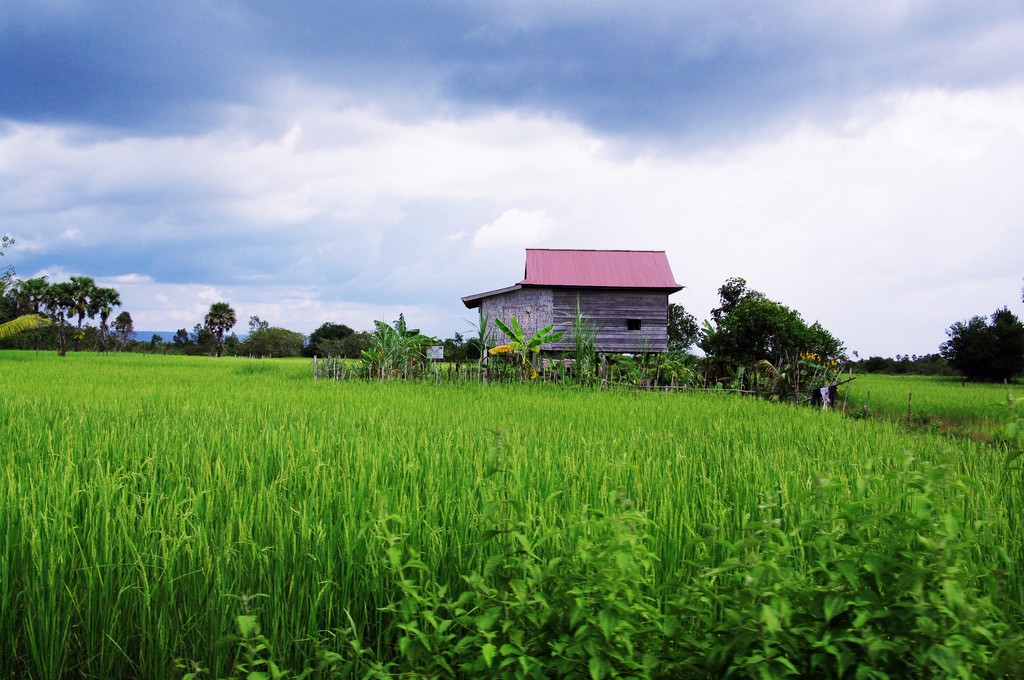
ជីវិតលើវាលស្រែ។ រូបភាព ថតដោយ CX15 កាលពីថ្ងៃទី ១៣ ខែវិច្ឆិកា ឆ្នាំ២០០៩។ ក្រោមអាជ្ញាប័ណ្ណ CC BY-NC-ND 2.0.
ព័ត៌មានពាក់ព័ន្ធនឹងការលក់ និងការជួញដូរដីនៅកម្ពុជា មិនទាន់មានគ្រប់គ្រាន់នៅឡើយ។ ទោះបីជាក្របខ័ណ្ឌផ្លូវការសម្រាប់ការលក់ និងការជួញដូរដី ត្រូវបានតាក់តែងឡើងក្រោមច្បាប់ភូមិបាលឆ្នាំ ២០០១ ប៉ុន្តែច្បាប់ស្តីពីការអនុវត្តក្រមរដ្ឋប្បវេណីឆ្នាំ ២០១១ បានលុបចោលផ្នែកជាច្រើននៃក្របខ័ណ្ឌនោះ។
ការលក់ដីធ្លីតាមរយៈកិច្ចសន្យា នាំឱ្យមានការផ្ទេរសិទ្ធិនៃភាពជាម្ចាស់ទៅលើដី។ យ៉ាងនេះក្តី ដើម្បីអាចអនុវត្តបាន កិច្ចសន្យានេះ ត្រូវតែចុះបញ្ជី។1 ម្យ៉ាងទៀត អចលនវត្ថុអាចត្រូវផ្ទេរដោយសន្តតិកម្ម។2 អចលនវត្ថុ ដែលត្រូវបានកាន់កាប់ដោយស្របច្បាប់ ប៉ុន្តែមិនមានកម្មសិទ្ធិ អាចនឹងផ្ទេរបាន3 ដូចដែលច្បាប់ភូមិបាលឆ្នាំ ២០០១ បានចែងពីសិទ្ធិបណ្តោះអាសន្នលើអចលនវត្ថុ ដែលក្នុងនោះ ពួកគេមានសិទ្ធិដូចគ្នាទៅនឹងម្ចាស់កម្មសិទ្ធិករដែរ។
ការខកខានមិនបានចុះបញ្ជីការផ្ទេរសិទ្ធិមានទៅលើដីជាបន្តបន្ទាប់ បង្ហាញពីការប្រឈមសំខាន់ៗ ជាច្រើនចំពោះសន្តិសុខកម្មសិទ្ធិដីធ្លី និងប្រព័ន្ធផ្តល់ប័ណ្ណកម្មសិទ្ធិដីធ្លី។4 ដីធ្លីចុះបញ្ជីរួច ត្រូវចុះបញ្ជីឡើងវិញជាមួយអាជ្ញាធរសុរិយោដី នៅពេលដីនោះត្រូវបានផ្ទេរទៅម្ចាស់ថ្មី។5 ដំណើរការនេះ ធានាថា ការចុះបញ្ជីដីធ្លីត្រូវបានធ្វើបច្ចុប្បន្នភាព ហើយប័ណ្ណកម្មសិទ្ធិថ្មីត្រូវបានផ្តល់ជូន និងផ្តល់លទ្ធភាពឲ្យរដ្ឋាភិបាលប្រមូលពន្ធផងដែរ។ ក៏ប៉ុន្តែ ជាក់ស្តែង រាល់ការផ្ទេរសិទ្ធិកម្មសិទ្ធិ ១ ក្នុងចំណោម៤ករណី មិនត្រូវបានចុះបញ្ជីផ្លូវការទេ។6 ប្រសិនបើស្ថានភាពនេះពិតជាមានមែន ការចុះបញ្ជីនៅកម្ពុជា អាចមិនជាក់លាក់ និងមិនមាន បច្ចុប្បន្នភាពនៅឡើយ។7 ព័ត៌មានមិនត្រឹមត្រូវនិងមិនអាចជឿទុកចិត្តបាន អាចនាំឱ្យកើតមានការដោះស្រាយជម្លោះមិនយុត្តិធម៌ ខណៈដែលម្ចាស់កម្មសិទ្ធិចុះបញ្ជីចុងក្រោយ នឹងមានសិទ្ធិទាមទារតាមផ្លូវច្បាប់ ច្រើនជាង។ ហេតុផលជាទូទៅ សម្រាប់មិនចុះបញ្ជីការផ្ទេរសិទ្ធិកម្មសិទ្ធិលើដីធ្លី គឺតម្លៃខ្ពស់ (ទាំងតម្លៃផ្លូវការ និងមិនផ្លូវការ) សម្រាប់សេវានេះ និងកង្វះខាតការយល់ដល់ពីបញ្ហាចុះបញ្ជី។8
បញ្ហានេះ បានលេចចេញជារូបរៀងកាន់តែច្បាស់ឡើងៗ ដែលថា ការលក់ដីដោយបង្ខំ និងដោះទាល់ គឺជាមូលហេតុចម្បង នៃអសន្តិសុខកម្មសិទ្ធិដីធ្លី។9 ការលក់ដោះទាល់ អាចកើតមាននៅពេលដែលគ្រួសារប្រឈមនឹងបំណុល ឬបញ្ហាលំបាក ដូចជា ឈឺធ្ងន់។10 ការសិក្សានៅឆ្នាំ ២០១៥ ទៅលើភាពគ្មានដីធ្លី រាយការណ៍ថា គ្រួសារជិត ៣១ភាគរយ ដែលស្ថិតក្នុងការសិក្សានេះ គឺជាអ្នកគ្មានដីធ្លី ដោយសារពួកគេបានលក់ដីទាំងនោះ។11 ការសិក្សាស្រាវជ្រាវផ្សេងទៀត រកឃើញថា ការលក់ដីដោយបង្ខំ ទំនងជា កើតមានឡើង នៅក្នុងតំបន់ដែលដីមានតម្លៃខ្ពស់ ឬកន្លែងដែលក្រុមហ៊ុនឯកជនចង់បង្កើនទំហំដីកាន់តែធំឡើង សម្រាប់ការអភិវឌ្ឍ។12 នៅក្នុងប្រទេសដែលមានប្រជាជន ៨០ភាគរយ រស់នៅទីជនបទ និង ៧៣ភាគរយ ពឹងផ្អែកលើវិស័យកសិកម្ម សម្រាប់ចិញ្ចឹមជីវិត ការលក់ដីបែបនេះ អាចជះឥទ្ធិពលខ្លាំង និងមានផលប៉ះពាល់សម្រាប់រយៈវែង លើជីវភាពរស់នៅ និងសុខុមាលភាពរបស់ប្រជាជននៅជនបទ។13
ធ្វើបច្ចុប្បន្នភាពចុងក្រោយ៖ ១ វិច្ឆិកា ២០១៥
ទាក់ទងនឹងការទិញលក់ និងការធ្វើពាណិជ្ជកម្មដីធ្លី
- ចំណាត់ថ្នាក់ដីធ្លី
- ការកាន់កាប់ដីធ្លី និងការចេញប័ណ្ណកម្មសិទ្ធិដីធ្លី
- ការផ្ទេរដីធ្លី
- សិទ្ធិដីធ្លី ផ្ទះសម្បែង និងការបណ្តេញចេញ
ឯកសារយោង
- 1. ច្បាប់ភូមិបាលឆ្នាំ ២០០១, មាត្រា ៦៩។
- 2. ច្បាប់ភូមិបាលឆ្នាំ ២០០១, មាត្រា ៧២-២២។
- 3. ច្បាប់ភូមិបាលឆ្នាំ ២០០១, ជំពូក ៤។
- 4. ម៉ាក ហ្រ្គីមឌីជ. ឆ្នាំ២០១២. “សិទ្ធិទទួលបានកម្មសិទ្ធិដីធ្លី នៅកម្ពុជា៖ ការសិក្សាលើការចុះបញ្ជីជាប្រព័ន្ធ នៅខេត្តចំនួនបី និងរាជធានី នៃប្រទេសកម្ពុជា.” រាជធានីភ្នំពេញ: វេទិកានៃអង្គការមិនមែនរដ្ឋាភិបាលស្តីពីកម្ពុជា។
- 5. ក្រមរដ្ឋប្បវេណី, មាត្រា ១៣៣-៣៥។
- 6. ហ្រ្គីមឌីជ. ឆ្នាំ២០១២. ទំព័រ ៩៣។
- 7. ដូចលេខយោងខាងលើ។
- 8. ដូចលេខយោងខាងលើ។
- 9. អាលីស ប៊ីប៊ែន និង ពូ សុវច្ចនា. ឆ្នាំ២០១៥. “សន្តិសុខមនុស្ស និងសិទ្ធិដីធ្លីនៅកម្ពុជា.” រាជធានីភ្នំពេញ: វិទ្យាស្ថានខ្មែរសម្រាប់សហប្រតិបត្តិការ និងសន្តិភាព. http://www.cicp.org.kh/userfiles/file/Publications/Human-Security-executive-summary-eg-2.pdf ។
- 10. អាល់ហ្វន យូលែនប៊ឺក. ឆ្នាំ២០០៩. “វិនិយោគផ្ទាល់ពីបរទេស (FDI) លើវិស័យដីធ្លីនៅកម្ពុជា.” អង្គការ ជីធីហ្សែត. http://www2.gtz.de/dokumente/bib-2010/gtz2010-0061en-foreign-direct-investment-cambodia.pdf ។
- 11. អាលីស ប៊ីប៊ែន និង ពូ សុវច្ចនា. ឆ្នាំ២០១៥. “សន្តិសុខមនុស្ស និងសិទ្ធិដីធ្លីនៅកម្ពុជា.” រាជធានីភ្នំពេញ: វិទ្យាស្ថានខ្មែរសម្រាប់សហប្រតិបត្តិការ និងសន្តិភាព. ទំព័រ២៨. http://www.cicp.org.kh/userfiles/file/Publications/Human-Security-executive-summary-eg-2.pdf ។
- 12. សែន ដេវីឌ. ឆ្នាំ២០១៥. “គ្រួសារខ្លះនិយាយថា ការលក់ដីត្រូវធ្វើដោយបង្ខំ.” ភ្នំពេញ ប៉ុស្តិ៍ ថ្ងៃទី ១៣ ខែមីនា. www.phnompenhpost.com/land-sales-forced-say-families។
- 13. អាលីស ប៊ីប៊ែន និង ពូ សុវច្ចនា. ឆ្នាំ២០១៥។ តំណាងរបស់អង្គការកសិកម្ម និង ស្បៀងអាហារ (FAO) ប្រចាំនៅកម្ពុជា. ឆ្នាំ២០១១. ប្រទេសកម្ពុជា និង ដំណើររឿងអំពីសមិទ្ធិផលសម្រេចបាន និងជោគជ័យរបស់អង្គការកសិកម្ម និង ស្បៀងអាហារ (FAO). http://www.fao.org/3/a-at004e.pdf ។

